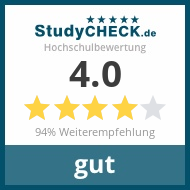Industrial Management in Microelectronics (M. Sc.)
Gain solid and fundamental knowledge.
Target group
- This course is designed for graduates who have work experience in the field of engineering and want to gain solid and fundamental knowledge in modern aspects of processor technology, packaging, microsystem and sensor technology as well as fundamental information on operations and logistics management and project management in semiconductor industry and related branches. Therefore, combining the competencies of engineers with those of managers in this field.
Advantages
Overview of the study contents
First semester modules
- Circuits and Devices
Basic principles and practical applications of analog and digital circuits
- Semiconductor Technology I
Basic principles of fabrication and miniaturization of semiconductor devices and circuits
- Microsystems and Sensor Technology
Analytical view as well as practical hands-on perspective on MEMS fabrication processes and overview on microsensors
- Packaging in Microelectronics I
Basic principles of electronic device assembly as well as circuit board and interposer fabrication
- Operations and Logistics Management I
Basic understanding of the different logistic subsystems, historical development, characteristics, aims and objectives as well as future logistic trends
- Investment and Financing
Basic principles of investment planning and investment decisions as well as basic understanding of uncertainty, risk, corporate financing, cash and credit management
Second semester modules
- Semiconductor Technology II
In-depth understanding thermal processes , lithography and the interaction between physical fundamentals and function principles
- Packaging in Microelectronics II
Applying the knowledge of basic principles to microelectronic devices, printed circuit boards and electronic systems
- Project Management
Analytical view as well as strategic and practical hands-on perspective on operations and business processes
- Operations and Logistics Management II
In-depth understanding of different concepts to optimize logistic processes and models to calculate production and order lot sizes.
Master's Thesis
After finishing these modules the students will complete their master's thesis.
Scientific Director

Prof. Dr. Rainer Lasch
Chair of Business Management, esp. Logistics, Technische Universität Dresden (TUD)

Prof. Dr. Gerald Gerlach
Institute of Solid-State Electronics, Technische Universität Dresden (TUD)
Lecturers
Prof. Dr. Rainer Lasch
Chair of Business Management, esp. Logistics, Technische Universität Dresden (TUD)Prof. Dr. Gerald Gerlach
Institute of Solid-State Electronics, Technische Universität Dresden (TUD)Prof. Dr. Thomas Mikolajick
Chair of Nanoelectronic Materials, Technische Universität Dresden (TUD)Prof. Dr. Johann W. Bartha
Former Chair Holder of the Institute of Semiconductors and Microsystems, Technische Universität Dresden (TUD)Prof. Dr. Karlheinz Bock
Chair of Electronic Packaging Technology, Technische Universität Dresden (TUD)Prof. Dr. Thorsten Schmidt
Chair of Material Handling, Technische Universität Dresden (TUDProf. Dr. Ulrike Stopka
Chair of Information and Communication Business Management Economics, Technische Universität Dresden (TUD)
Admission requirements
- Bachelor’s Degree (4 years degree) in Electrical Engineering, Automation, Solid-State Physics, IT - 240 Credit Points
- Average Grades Exceeding 70 %
- Knowledge in English: IELTS 6.0 or TOEFL iBT 79
- Motivation for International and Intercultural Experience
- Minimum: 1 year of work experience
Kompakt
- Degree:
- Master of Science in Industrial Management in Microelectronics (M.Sc. IMM)
- Place of study:
- Dresden
- Start of study:
- 01. October 2024
- Duration:
- 3 semesters, 18 month incl. Master Thesis
- Credit points:
- 60 points
- program type:
- full time
- Tuition fee:
- 895 € per month
- Scholarship Database:
- Here you can find information on various kinds of DAAD funding for foreign students, graduates and postdocs as well as on funding offered by other selected organisations.
Personal advice
Personal advice
by our Indian Country Manager
Personal advice
by our Iran Country Manager
flexible learning
The lectures take place for the most part in presence and online. Study materials are made available to students to enable asynchronous self-organized learning.
Lecture-free period phases during the summer and Christmas periods.
in-depth expert knowledge
The team of lecturers in the program includes both top-class scientists and experienced practitioners. In this way, well-founded information from science and research is combined with a high degree of practical relevance.
extensive exchange
Participants in this course come from a wide variety of fields and can greatly benefit from diverse learning groups, to expand their horizon. We offer interdisciplinary exchange in a relaxed atmosphere.














